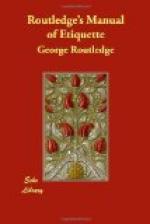* * * * *
IV.—EXPENSE OF DRESS.
This is a portion of our subject which awakens the liveliest interest in persons of both sexes. It is the complaint of many men of our times that the dress of women is a very costly affair. The complaint is often made apparently under a sense of wrong, as if they had been made to suffer from it. Some time ago considerable attention was directed to the subject by some letters which appeared in one of the leading journals of the day, in which grave reflections were made upon the exceeding costliness of dress at the present time. It was said to exceed that of any former age, and to be the reason why so many young men flinch from the idea of matrimony. Among these requirements dress occupies a prominent place. The style and variety of dress which is affirmed to be necessary for young ladies in the highest grade of society renders it no easy matter for them to find men both qualified and willing to afford them sufficient funds to procure what custom had created into a necessity. It may be owing to the quantity of material which the dressmakers require in order to make a dress, as well as to the variety which fashion has prescribed. At all events, let people say what they may, we believe that there is no doubt whatever that the expense of dress has become very much greater than it was thirty years ago. A dressmaker could then make a very first-rate gown, suited to any function at Court or elsewhere, for ten or twelve pounds, whereas now the most ordinary gown, suitable to wear only at a family dinner-party, cannot be made for less than fourteen or fifteen pounds. A ball gown will cost eighteen or twenty pounds; and in Paris a thousand francs, (forty pounds,) is considered nothing out of the way; and evening and ball dresses often cost two thousand francs each. It is not surprising then that, if this is the ordinary expense of a lady’s dress, men should hesitate before they embark in matrimony, and add so large an item to their expenditure. We remember to have heard it said that five hundred a year pin-money was a very small allowance for a young married woman; that it would require the most wonderful management to enable her to dress well and keep within her income. Of course every one knows that there are many women who dress upon infinitely less; but we are speaking of those who profess to dress well, and whose position in society requires them to be well dressed.




